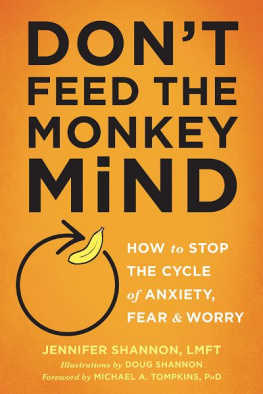
Contents
1 YES, IT IS A GODDAMN JUNGLE OUT THERE
Why Acting Like an Animal Comes So Easy
2 NICE MONKEY
The Search for the Unselfish Gene
3 BEING NEGATIVE
Why Things Look Worse than They Probably Are
4 ROUGH BEASTS
Moores Law Meets Monkey Law
5 DONUT DOMINANCE
Why Hierarchy Works
6 TOOTH AND CLAW
How We Wage Dominance Contests on the Job
7 BENDING THE KNEE
Strategies for Subordinates
8 CHATTER IN THE MONKEY HOUSE
Gossip and the Beastly Secret of Oh, My God, Tell Me More
9 BANG BANG, KISS KISS
The Natural History of Im Sorry
10 MAKING FACES
A Field Guide to Facial Expression
11 FACIAL PREDESTINATION
How the Shape of Your Face Can Make or Break Your Career
12 MONKEY SEE...
The Power of Imitation
13 BUNNIES FOR LUNCH
On Being a Corporate Predator
14 A LANDSCAPE OF FEAR
Why Do Jerks Seem to Prosper?
15 RUNNING WITH THE PACK
Why Lone Wolves Are Losers
EPILOGUE
Leadership Lessons of Highly Effective Apes
For cubicle monkeys everywhere, in the hope that this book will help them lift up their headsand hoot.
YES, IT IS A GODDAMN JUNGLE OUT THERE
Why Acting Like an Animal Comes So Easy
Animals in the wild lead lives of compulsion and necessity within an unforgiving social hierarchy in an environment where the supply of fear is high and the supply of food low and where territory must constantly be defended and parasites forever endured.
YANN MARTEL, Life of Pi
S ounds like an average day at the office, doesnt it? Compulsion, necessity, the unforgiving social hierarchy, parasites... Oh, and the high supply of fear. That one I could feel butterfly-fluttering in my abdomen and ant-dancing out on the fringes of my peripheral nervous system. I was standing in front of the top North American distributors for a leading European manufacturer. We had assembled at a resort in the Grand Tetons, in an area still populated by grizzly bears and gray wolves, to which I expected shortly to be thrown. Id been asked to give a talk about how businesspeople act like animals. I was vaguely nervous.
The top baboon for the North American division, a big, bluff fellow, sat in the front row, arms folded, with his wife (blond, witty, appealing) to one side and his head of sales (short, round, ebullient) on the other. At dinner the night before I had gotten to know many of these people by first name. I recalled a quote about how businesspeople dont like being compared to bare-ass monkeys. I took a deep breath.
Everybody in the room had heard the statistic that humans are roughly 99 percent genetically identical to chimpanzees. By some estimates, the difference between our two species may be a matter of fewer than fifty genes, out of perhaps twenty-five thousand shared in common. But hardly anyone in the business world seems to have considered what that might mean in our working lives. More often than not, managers endeavor to minimize the human, much less the animal, element and make companies hum like machines. In their own lives, individual workers also tend to treat human nature mainly as something to be overcome, by getting the hair waxed from their torsos or added to their scalps, by dressing for success, by giving at least the appearance of handling stress. (Was that the serene brow of Botox I detected on a woman in the first row? It was really too early in my talk for her to be numb with boredom.)
I asked my audience to think for a moment about how their everyday workplace behavior might be shaped by forces that are less susceptible to changeby the drives and predispositions bequeathed to us by our long evolution first as animals and later as tribal humans. By fear. By anger. By the primordial yearning for social allies and for status. Think of yourself, I suggested, as part of a primate hierarchy unconsciously following thirty-million-year-old rules for establishing dominance and submission, for waging combat and maintaining peace. Think about how the alpha, whether chimpanzee or chief executive officer, typically asserts authority with the identical language of posture, stride, lift of chin, directness of gaze, the sharp glower to quell an unruly subordinate.
The head guy in the first row started to light up at this, especially when I got to the stuff about using political maneuvering among chimpanzees as a better way to understand boardroom confrontations. He surged out of his seat when the talk was done and launched into what he called the natural history of the boardroom.
In the upper echelons at company headquarters, he said, the conference tables are circular rather than rectangular, ostensibly for a round-table atmosphere of equality. Well, bollocks, he said. In fact, there is a distinct hierarchy, and everybody knows where everybody else stands, or sits, in it; the circular form merely makes the combat a little more open. In a week or two, he said, hed be heading overseas for a meeting of a committee where the chairman had lately vacated his seat. No one will say anything. But everyone will be looking at that seat and wondering whos going to take it, whether anyone will have the audacity to sit there.
You should sit there, the head of sales ventured.
No, Id be like the baboon trying to rise three steps above his rankId get knocked down. He was a realist, yet keen for the combativeness that would inevitably surface. I love it, he said. Sometimes when theres a kill about to happen, theres a moment of hesitation when people arent sure if its going to happen.
By now my eyes were beginning to widen.
And then they get the scent, and they know its going to be okay, and they know whos going to take the lead, and whos going to come in for the kill.
Its like the Serengeti, the sales guy agreed. The round table just makes it easier for everybody to see the kill.
Jesus, I said.
Dont worry, the head guys wife interjected, taking him gently by the elbow. Im really in control here. And everybody laughed.
THIS COMPANY IS A ZOO
May be I shouldnt have been surprised that some businesspeople are in fact entirely prepared to liken themselves to bare-ass monkeys. They just want to be dominant, predatory bare-ass monkeys. Animal analogies have always ranked among the favorite clichs of the business world, where eight-hundred-pound gorillas run with the big dogs, swim with the sharks, occasionally find themselves up to their asses in alligators, and, if they are not crazy like a fox, can end up caught like a deer in the headlights.
When Richard Kinder quit Enron to form his own gas company in 1996, he disguised his dismay with Kenneth Lays leadership under a standard animalism: If you arent the lead dog, the scenery never changes. H. Ross Perot also resorted to animal analogies when he was tormenting the hapless, imperial General Motors CEO Roger Smith: Revitalizing General Motors is like teaching an elephant to tap-dance. You find the sensitive spots and start poking. (Or did he say lap dance? In any case, Lou Gerstner at IBM knew a good line when he saw it, and stole it for the title of his book, Who Says Elephants Cant Dance?) Even the eminently clever satirist Scott Adams ended up likening almost everybody in the working world of his antihero Dilbert to a weasel.
The truth beneath the clichs is that the lives of animals are not nearly so simple as we used to think. Nor are the lives of working people so complex as we like to believe. Moreover, the two have a lot in common, and not just in the obvious ways. For instance, aggressive business types often employ animal analogies because they mistake them for
Next page











